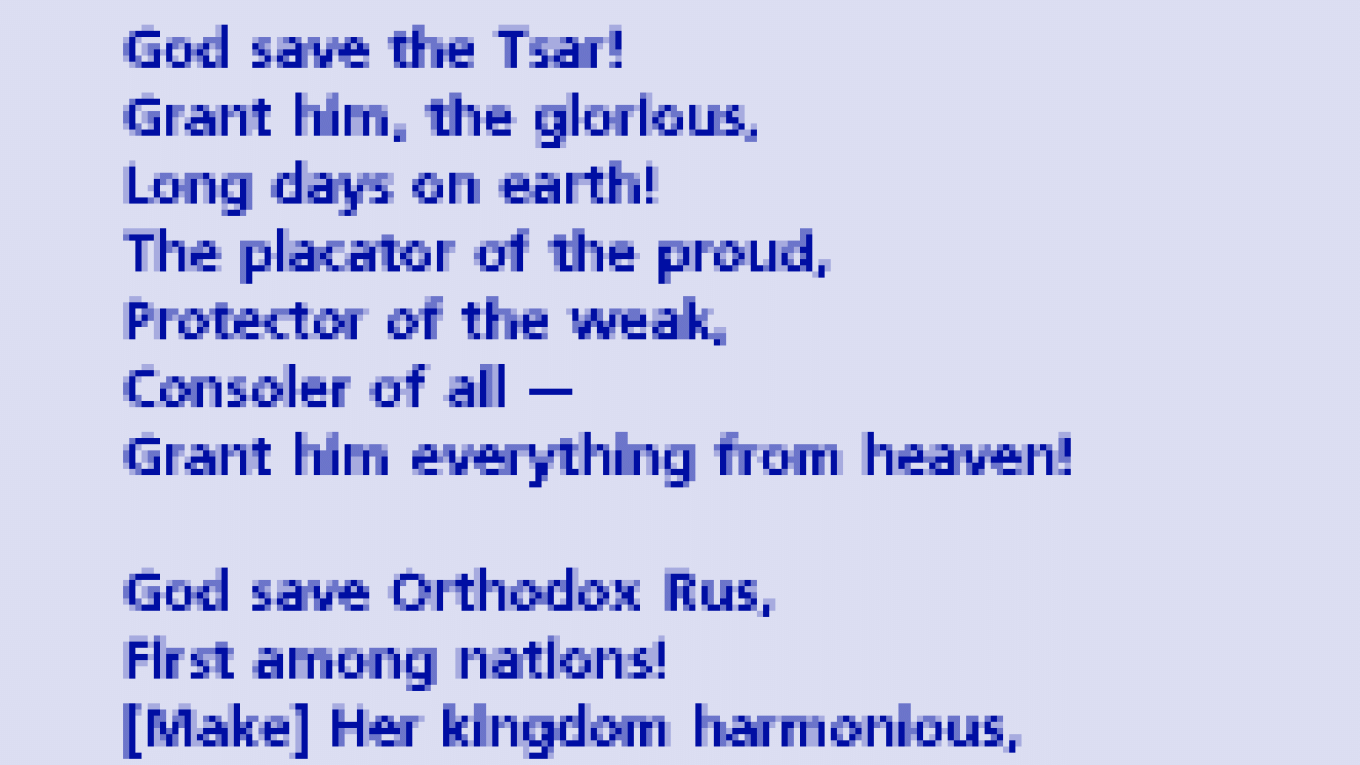The fledgling State Council, an advisory body made up of regional leaders, is scheduled to discuss the problem at its upcoming meeting Wednesday. And public figures ?€” from politicians to pop singers ?€” are voicing their opinions on the best tunes and texts.
Last month, President Vladimir Putin ordered St. Petersburg Governor Vladimir Yakovlev to come up with a set of national symbols ?€” first and foremost, lyrics to the tune of "Patriotic Song" by 19th-century composer Mikhail Glinka, declared the new anthem by then-President Boris Yeltsin in 1993.
Last week, the pro-Kremlin Unity party announced its preference for the tune of the Soviet anthem composed in 1944 by Alexander Alexandrov, fueling earlier rumors that Putin himself favors this tune.
State Duma Speaker Gennady Seleznyov likewise backed the Stalin-era score, saying he hoped Russians would ring in 2001 with a new anthem combining updated lyrics and "the music with which our people associate many of their achievements."
Meanwhile, a Yakovlev spokesman said last week that the governor would back Glinka?€™s melody.
"The Soviet tune is ?€¦ backed by the majority of governors, but Governor Yakovlev said ?€¦ he would support Glinka?€™s melody," said spokesman Alexander Afanasyev.
Over the past decade, Glinka?€™s hard-to-hum and hard-to-remember score has failed to rouse the patriotic fervor of most Russians.
A recent poll conducted by the Public Opinion Fund showed that only 15 percent of respondents were happy with the existing anthem, while 49 percent supported the revival of the Soviet-era melody.
Nonetheless, Georgy Vilinbakhov, head of the State Heraldic Service and of Yakovlev?€™s working group, said the official search concerns new lyrics only and Glinka?€™s tune is here to stay.
"I see no reason to change the tune," Vilinbakhov said by telephone Monday from St. Petersburg. "The Soviet melody is the anthem of an absolutely different state; Glinka?€™s melody is ?€¦ the symbol of a country that has existed for 10 years."
Vilinbakhov said his office is considering various lyrics, including dozens of submissions by "enthusiasts" from across the country. Selected texts are then sent to be recorded by vocalists with the St. Petersburg Admiralty Orchestra. The recordings, Vilinbakhov said, will go to Yakovlev?€™s office and the Presidential Administration.
Though Vilinbakhov?€™s mission is to help select lyrics, he believes that, for an anthem, music is preeminent.
"No matter what the words are, the essence of an anthem is always the music," he said.
Vilinbakhov dismissed complaints by some athletes, primarily soccer team Spartak Moscow, who appealed to Putin over the summer, saying the "unsingable" anthem has led to a drop in morale and, consequently, poor performance.
He recalled that the Soviet anthem remained wordless for more than 20 years after the denunciation of Stalin ?€” until a new version with no references to the totalitarian dictator was introduced under Leonid Brezhnev in 1977.
"I would like to remind them [the athletes] that their colleagues were in the same position for some 20 years and their achievements were no less spectacular [than with lyrics]," Vilinbakhov said.
Besides Alexandrov?€™s Soviet-era anthem, two other tunes have been cited most often as potential replacements: the old imperial anthem "God Save the Tsar" used by Pyotr Tchaikovsky in his "1812 Overture" and Glinka?€™s "Glory" from his opera "A Life for the Tsar," which sounded at Putin?€™s inauguration last May. The tune of the latter was often considered a second, unofficial anthem in both tsarist and post-revolutionary years.
The history of the national anthem has never been particularly smooth. The first version appeared in 1833 under Nicholas I; "God Save the Tsar" ?€” which resembled the British national anthem ?€” was composed by Alexei Lvov to the lyrics of the tsar?€™s childhood tutor, poet Vasily Zhukovsky. Although Glinka composed his "Patriotic Song" the same year, he did not submit it for consideration.The notes were found in his archives only after his death.
After the 1917 Bolshevik Revolution, the new anthem became the Socialist "Internationale," which was succeeded in 1944 ?€” at Stalin?€™s request ?€” by Alexandrov?€™s tune, with lyrics by Sergei Mikhalkov, which were later altered to remove the references to Stalin.
In recent months, the renewed dispute has provoked a number of parodies.
In a short-lived musical program hosted by Nikolai Fomenko on NTV, the audience was invited to write lyrics using the tune of "The Slav?€™s Farewell;" the recurring themes in the texts were abundant oil and male libido.
The Novaya Gazeta newspaper published its take on the Soviet anthem, skewing the familiar lyrics to read: "Sing to the Motherland, home of the wealthy, bulwark of oil and natural gas."
Ballet legend Maya Plisetskaya spoke out earnestly in favor of "Patriotic Song," saying no one could have written the tune better than Glinka.
"Words are unnecessary," Plisetskaya was quoted by Interfax as saying Thursday. "There are songs with no lyrics that express everything better than any lyrics."
If the government heeds her advice, Russia will not be alone: Spain?€™s national anthem, for example, has no lyrics either.
A Message from The Moscow Times:
Dear readers,
We are facing unprecedented challenges. Russia's Prosecutor General's Office has designated The Moscow Times as an "undesirable" organization, criminalizing our work and putting our staff at risk of prosecution. This follows our earlier unjust labeling as a "foreign agent."
These actions are direct attempts to silence independent journalism in Russia. The authorities claim our work "discredits the decisions of the Russian leadership." We see things differently: we strive to provide accurate, unbiased reporting on Russia.
We, the journalists of The Moscow Times, refuse to be silenced. But to continue our work, we need your help.
Your support, no matter how small, makes a world of difference. If you can, please support us monthly starting from just $2. It's quick to set up, and every contribution makes a significant impact.
By supporting The Moscow Times, you're defending open, independent journalism in the face of repression. Thank you for standing with us.
Remind me later.


